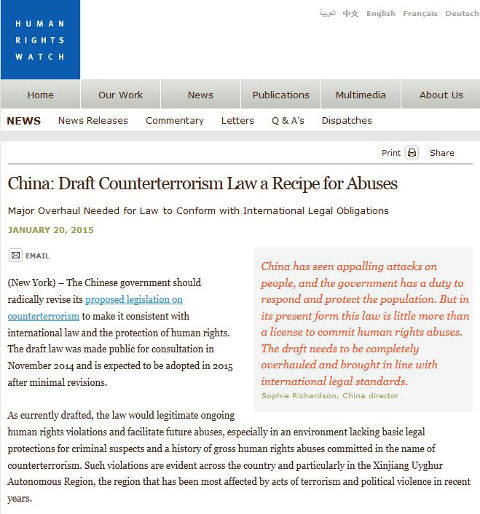One would think that the last thing people would worry about in an authoritarian communist country like China would be the loss of human rights. But things have been changing in the PRC as liberalization of the Chinese economy, a growing middle class and the communications revolution have resulted in much greater freedom, wealth, property and legal rights. The Chinese government may be looking to curb some of these freedoms by playing the Islamic terrorism card, from its frontier area of Xinjiang, to pass tough new counter-terrorism laws. Human Rights Watch issued a press release warning against the possibility that these measures may do more than fight terrorism. The very vague definition of terrorism, expansion of state surveillance powers to enforce complete digital surveillance and targeting NGOs will harm the human rights of Chinese citizens.
China’s use of this concept of “never let a crisis go to waste” is by no means unique to them. Even liberal western democracies that would consider themselves the bastions of freedom have used terrorist acts to bring restrictive laws in place. The USA Patriot Act may be the most well known and even though it has seen some opposition, the law has been in place for over 13 years. Canada, United Kingdom, Australia, New Zealand, Belgium, etc. have all used the Islamic terror threat to beef up their counter-terrorism laws and security infrastructure. HRW may have issued similar press releases in these cases but we are not sure how persistent or effective they have been in preserving the human rights and freedoms of all people.

Human Rights Watch (HRW) has concerns about new Chinese terror legislation
“The draft counterterrorism law states that “counter terrorism work shall be conducted in accordance with the law” and that “human rights shall be respected and guaranteed” (art. 6). But the 106-article draft makes clear the government’s intent to establish a counterterrorism structure with enormous discretionary powers, define terrorism and terrorist activities so broadly as to easily include peaceful dissent or criticism of the government or the Communist Party’s ethnic and religious policies, and set up a total digital surveillance architecture subject to no legal or legislative control.” (Human Rights Watch)